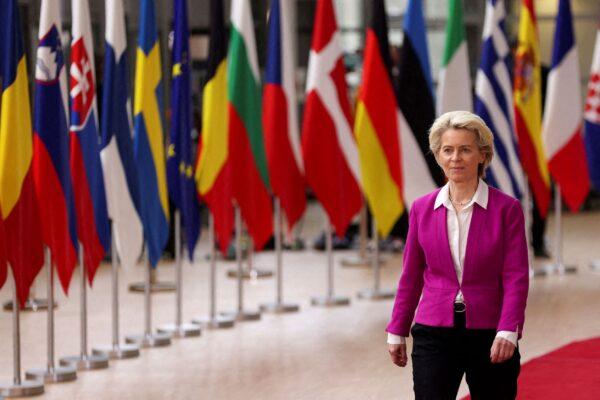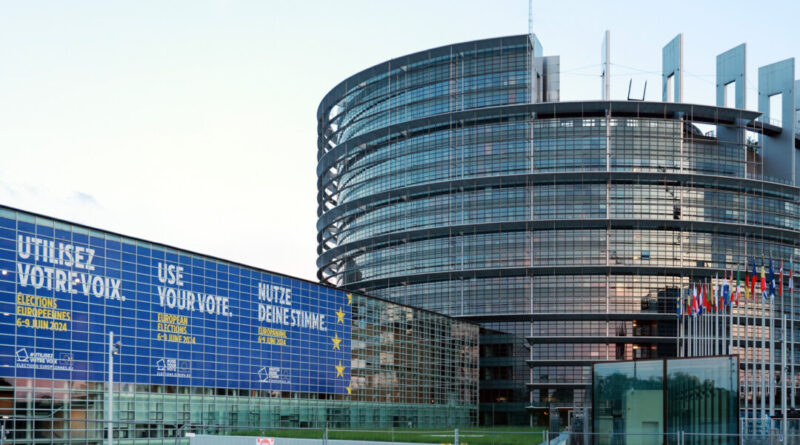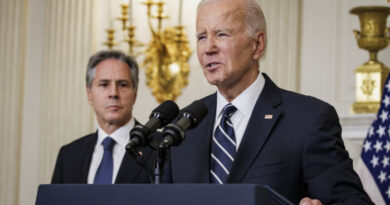Expert predicts that EU elections will not bring significant changes to Brussels
Even if right-wing parties win 25 percent of the vote, they won’t have enough to form a governing coalition in the European Parliament, according to the expert.
Predictions that right-wing groups will significantly increase their seats in the current European Parliament elections might not result in a conclusive shift in European policy direction, says Marcin Kedzierski, assistant professor at the department of international relations at the Cracow University of Economics in Poland.
The elections commenced on June 6 and will conclude late on June 9.
Anticipating about 25 percent of the votes, right-wing parties, also known as Euroskeptics, can expect significant representation depending on the voter turnout, as per Mr. Kedzierski.
“The lower the turnout, the better the results for those Euroskeptics, because [their voters] are more mobilized to go to the polls,” he told The Epoch Times.
Mr. Kedzierski noted that European elections generally attract fewer voters compared to national elections in most countries.
Even if right-wing candidates secure 30 percent of the vote, they still won’t be able to establish a governing coalition in the European Parliament, according to Mr. Kedzierski.

“The coalition will primarily consist of the center-right from the European People’s Party, the center-left from the Social Democratic Party, the liberals from [Renew Europe,] and the Greens,” he explained.
Renew Europe is currently the third largest political group in the European Parliament.
Role of the European Parliament
The political system of the EU is complex as it operates similar to a state but not quite like a national parliament such as the U.S. Congress, Mr. Kedzierski highlighted.
The laws of the European Union are jointly crafted by both the elected European Parliament and the Council of the European Union, which consists of national ministers from each of the bloc’s 27 member nations, as Mr. Kedzierski elaborated.
According to him, these two institutions need to reach agreements on specific law provisions.
Mr. Kedzierski pointed out that in the past, the European Parliament’s role was advisory and did not involve decision-making. However, with each election cycle, the parliament’s influence has gradually increased.
The EU’s system of influence comprises three interconnected levels: member states with significant economies like Germany, France, and Italy; European institutions such as the parliament and European Commission; and the lobbying level, including businesses, nongovernmental organizations, among others, as per Mr. Kedzierski.
Integration
European integration denotes the process of economic, political, and social integration facilitated by cooperation among European countries, primarily driven by the European Union.
Mr. Kedzierski suggested that the election outcomes may manifest a new trend in EU integration direction.
He noted that the EU has experienced periods of accelerated integration and slowdowns in the integration process since its establishment due to various crises in Europe like the oil crisis of the 1970s, the global financial crisis in 2008, the Greek debt crisis post entry into the eurozone, the migration crisis of 2015, and the conflict in Ukraine.
“It appears that this era of crises is nearing its end, and we are approaching a phase where a new momentum, a fresh acceleration, can be imparted to European integration,” he said.
“This election will serve as an indicator of whether this endeavor will be successful or not.”
Mr. Kedzierski stated that key countries like Germany and France have traditionally influenced the trajectory of the European integration process.
He noted that the policies of these countries differ, with France advocating that what benefits the country should be beneficial for the EU, while Germany believes that what benefits the Union is also favorable for Germany, although it heavily shapes decisions within the Union.
Mr. Kedzierski underscored that a political union essentially means a fiscal union for EU members. “The Germans understand that it’s not the French, but the Germans, who will be required to pay,” he said.
“Considering that Germany has reaped significant advantages from integrating into the eurozone, [the common European currency,] the expectation is for them to share some of those benefits with the poorer nations in the Union that are currently experiencing losses from eurozone integration,” Mr. Kedzierski added. However, he mentioned that Germany is not keen on this idea.

Multi-Speed Europe
The concept of deepening European integration emerged in the 1950s, but the approach known as “multi-speed Europe” didn’t take shape until the late 1990s, as outlined by Mr. Kedzierski.
This model envisions different member states integrating at varying speeds within the Union. For instance, some countries may have varying levels of integration within the eurozone or the border-free Schengen area.
“Currently, we have two unofficial membership categories,” Mr. Kedzierski pointed out. “There are more integrated countries and less integrated countries.”
He suggested that if Ukraine joins the EU, it could mark the beginning of a third membership category.
The question of whether to bolster the EU by deepening integration among current members or by expanding the Union by admitting new states has been a long-standing debate.
Mr. Kedzierski indicated that both approaches could be pursued.
Earlier this year, the European Parliament adopted a resolution on “Deepening EU integration in view of future enlargement.”
In November 2023, Charles Michel, the President of the European Council, stated that the EU should be prepared to welcome Ukraine by 2030.
“This doesn’t mean that Ukraine will automatically become a member of the Union, but rather [the EU] should be prepared to accept Ukraine,” Mr. Kedzierski clarified.

In addition, six Balkan countries, as well as Georgia and Turkey, have been granted candidate status and are currently aligning their national laws with EU standards, according to the EU website.
Euroskepticism
Members of right-wing political groups in the European Parliament often harbor critical views of the EU and European integration. Mr. Kedzierski suggested that this sentiment stems from increasing public disillusionment with the EU.
He referenced World Bank economist Branko Milanovic, stating that “globalization has made many people in the world wealthier, however, the middle class in developed countries has suffered the most.”
Mr. Kedzierski pointed out that a considerable portion of the voter base in EU countries like Germany, France, Italy, or Spain feel that the trajectory is undesirable.
He noted that younger individuals in their twenties and thirties perceive a future where they may fare worse than their parents.
“There is a growing sentiment that over the years, the European Union has alleviated issues faced by Europeans and elevated their standard of living. However, today, particularly in Western Europe, there is a public perception that the EU is not enhancing opportunities but rather diminishing them,” he said.
Frustrated by the perceived lack of EU solutions to their problems, younger citizens are turning to their national states for answers, according to Mr. Kedzierski.
“This resurgence of national parties is a consequence of this sentiment—seen in Germany, France, Italy, and other old European nations.”





